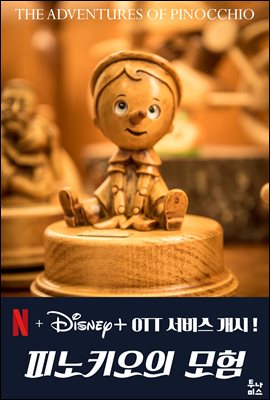
피노키오의 모험(영어)
- 저자Carlo Collodi 저
- 출판사투나미스
- 출판일2022-09-04
- 등록일2022-12-16
- SNS공유


- 파일포맷EPUB
- 파일크기574KB
- 공급사YES24
-
지원기기
PC
PHONE
TABLET
프로그램 수동설치
전자책 프로그램 수동설치 안내
아이폰, 아이패드, 안드로이드폰, 태블릿,
보유 1, 대출 0,
예약 0, 누적대출 7, 누적예약 0
책소개
The Adventures of Pinocchio is a children's fantasy novel by Italian author Carlo Collodi, written in Pescia. It is about the mischievous adventures of an animated marionette named Pinocchio and his father, a poor woodcarver named Geppetto.It was originally published in a serial form as The Story of a Puppet (Italian: La storia di un burattino) in the Giornale per i bambini, one of the earliest Italian weekly magazines for children, starting from 7 July 1881. The story stopped after nearly 4 months and 8 episodes at Chapter 15, but by popular demand from readers, the episodes were resumed on 16 February 1882. In February 1883, the story was published in a single book. Since then, the spread of Pinocchio on the main markets for children's books of the time has been continuous and uninterrupted, and it was met with enthusiastic reviews worldwide.
A universal icon and a metaphor of the human condition, the book is considered a canonical piece of children's literature and has had great impact on world culture. Philosopher Benedetto Croce reputed it as one of the greatest works of Italian literature. Since its first publication, it has inspired hundreds of new editions, stage plays, merchandising, television series and movies, such as Walt Disney's iconic animated version, and commonplace ideas such as a liar's long nose.
According to extensive research by the Fondazione Nazionale Carlo Collodi and UNESCO sources in the late 1990s, the book has been translated into as many as 260 languages worldwide, making it one of the world's most translated books. Likely one of the best-selling books ever published, the actual total sales since first being published are unknown due to the many reductions and different versions. The story has been a public domain work in the U.S. since 1940. According to Viero Peroncini: "some sources report 35 million [copies sold], others 80, but it is only a way, even a rather idle one, of quantifying an unquantifiable success". According to Francelia Butler, it also remains "the most translated Italian book and, after the Bible, the most widely read".
목차
CHAPTER 1CHAPTER 2
CHAPTER 3
CHAPTER 4
CHAPTER 5
CHAPTER 6
CHAPTER 7
CHAPTER 8
CHAPTER 9
CHAPTER 10
CHAPTER 11
CHAPTER 12
CHAPTER 13
CHAPTER 14
CHAPTER 15
CHAPTER 16
CHAPTER 17
CHAPTER 18
CHAPTER 19
CHAPTER 20
CHAPTER 21
CHAPTER 22
CHAPTER 23
CHAPTER 24
CHAPTER 25
CHAPTER 26
CHAPTER 27
CHAPTER 28
CHAPTER 29
CHAPTER 30
CHAPTER 31
CHAPTER 32
CHAPTER 33
CHAPTER 34
CHAPTER 35
CHAPTER 36

















